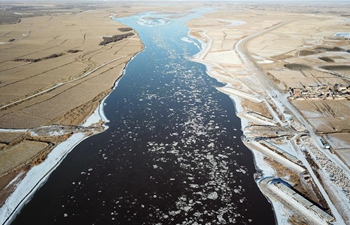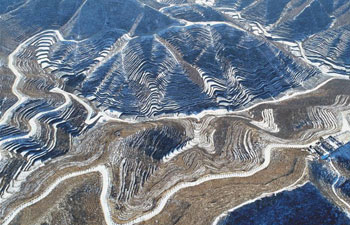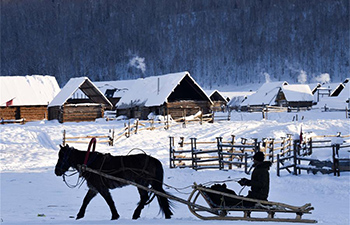
5-year-old Palestinian girl Rahaf Abu Amer is seen at her slum in Nuseirat Refugee Camp, central Gaza Strip, on Jan. 11, 2018. Israeli and International reports said the United States intents to freeze or delay its financial fund to the United Nations for Relief and Work Agency for Palestinian refugees in the Far East (UNRWA) and stop aid to the Palestinians until they return to the negotiations table with Israel. UNRWA, which provides assistance in education, health and food to some five million registered Palestine refugees in the Middle East, is already suffering from a 49 million U.S. dollars financial deficit and any fund suspension would have a negative impact on its work. (Xinhua/Wissam Nassar)
Jan. 9 (Xinhua) -- Palestinian refugee Ayman Dahlan from Shati Camp in Gaza city has been extremely concerned about the mounting U.S. and Israeli pressure on the United Nations for Relief and Work Agency for Palestinian refugees in the Far East (UNRWA), the UN agency that provides care for millions of Palestinian refugees across the world.
"Closing UNRWA is a death blow to me and to millions of Palestinian refugees," said middle-aged Dahlan, who is a father of seven.
On Sunday, Israeli Prime Minister Benjamin Netanyahu said in the weekly cabinet meeting that UNRWA should be gradually shut down.
He added that practical steps must be taken to change the situation in which UNRWA perpetuates the Palestinian refugee problem instead of resolving it.
His comments came after Israeli and international reports said the United States intents to freeze or delay its financial fund to UNRWA and stop aid to the Palestinians until they return to the negotiations table with Israel.
"UNRWA keeps us alive by providing us with food stuff and health care," Dahlan said as he sat in front of his shabby home at the impoverished refugee camp.
Dahlan, who has been jobless for four years, said most of Gaza residents suffer from very dire economic and financial conditions due to the blockade Israel imposed on the seaside enclave after Hamas violent takeover in 2007.
"Closing the agency will only add harm to the injury," he said.
UNRWA, which provides assistance in education, health and food to some 5 million registered Palestinian refugees in the Middle East, is already suffering from a 49-million U.S. dollars financial deficit and any fund suspension would have a negative impact on its work.
Meanwhile, more than 5 million registered Palestinian refugees in Jordan, Lebanon, Syria, West Bank and the Gaza Strip will suffer if the agency is shut down or its financial aid is suspended.
UNRWA takes care of some 1.3 million refugees in Gaza solely, who live in eight refugee camps.
For them, closing UNRWA would be the toughest blow after their plight of forcibly leaving their towns and cities that became part of Israel in the war of its foundation in 1948.
79-year-old Sada Mikdad is one of those refugees.
"Most of the food we consume at home is provided by UNRWA," the old lady told Xinhua.
Mikdad said Israel has always wanted the UNRWA to be closed because "the existence of UNRWA means the existence of the issue of Palestinian refugees."
The woman also complained that UNRWA has gradually reduced its assistance due to Israeli continued pressures and the limited international aid.
In response to Netanyahu's comments, UNRWA said that it would hold on its work under the mandate of the UN General Assembly.
UNRWA's media advisor, Adnan Abu Hasna, said the agency was established upon a resolution of the United Nations General Assembly, where the majority of members voted in favor of extending UNRWA's mandate.
"If anyone wants to change the nature of UNRWA's work, or wants to cancel its mandate, he must go to the United Nations General Assembly to get the majority of votes to change the UN mandate," Abu Hasna said.
Otherwise, he said, UNRWA will continue to carry out its work in its five operation areas until the issue of Palestinian refugees is resolved in a just and comprehensive way.
The Palestinian refugees' struggle to return has been one of the key and thorniest issues in the final status negotiations between the Palestinians and the Israelis, as both cling to their own beliefs in this regard.
The Palestinians base their assertion of the right of return on the United Nations General Assembly resolution number 194 of 1948, which calls for allowing the return of Palestinian refugees to their homeland and payment of compensation for those not wishing to go back, a resolution that Israel still denies.















